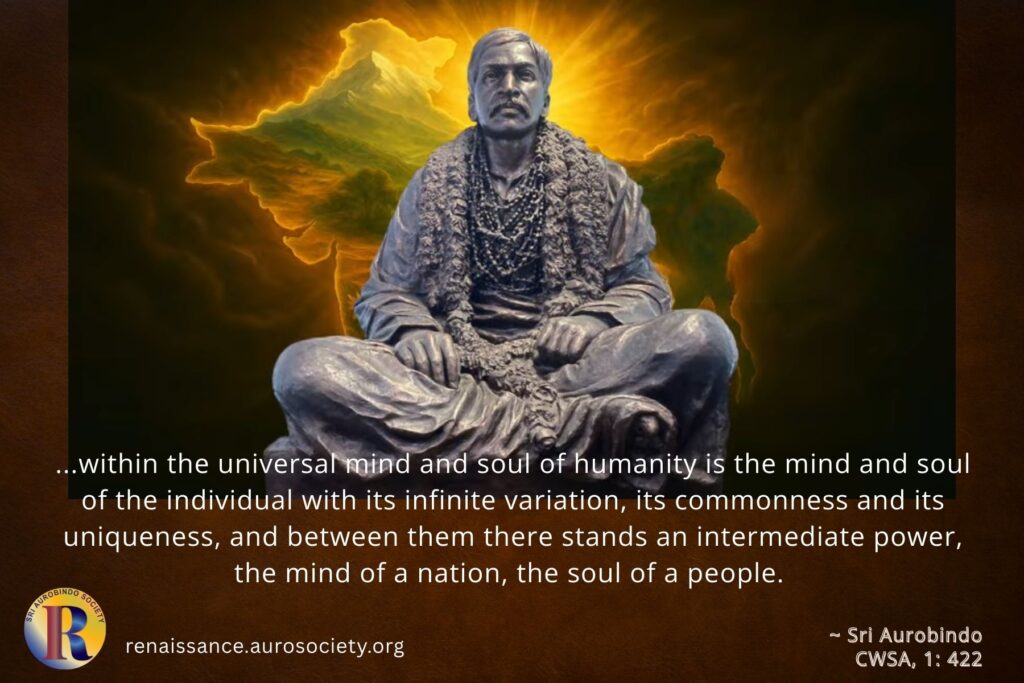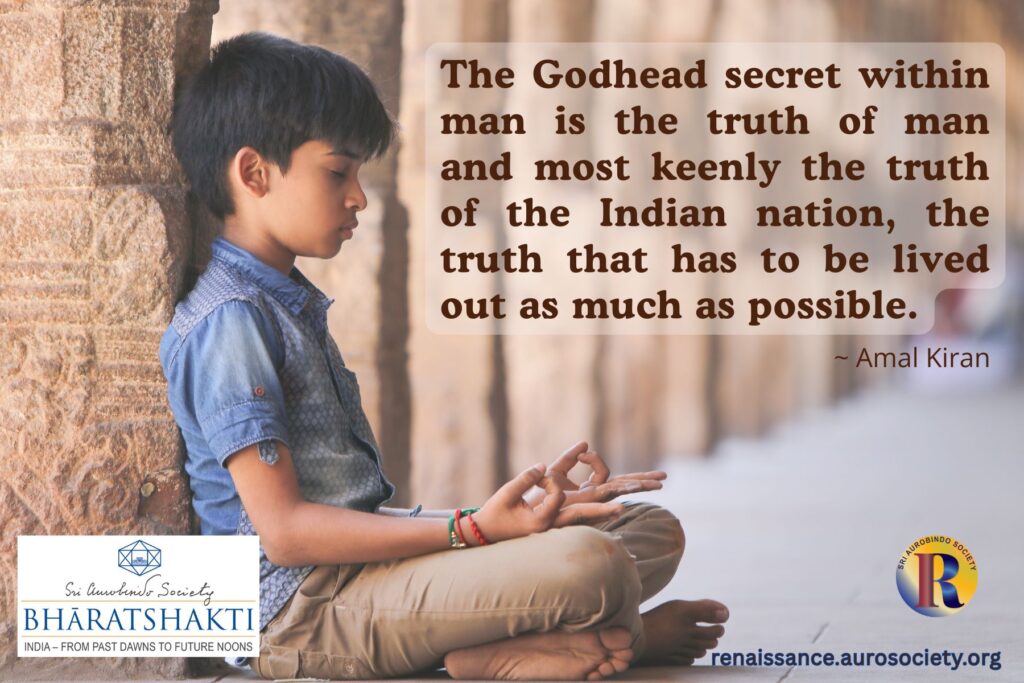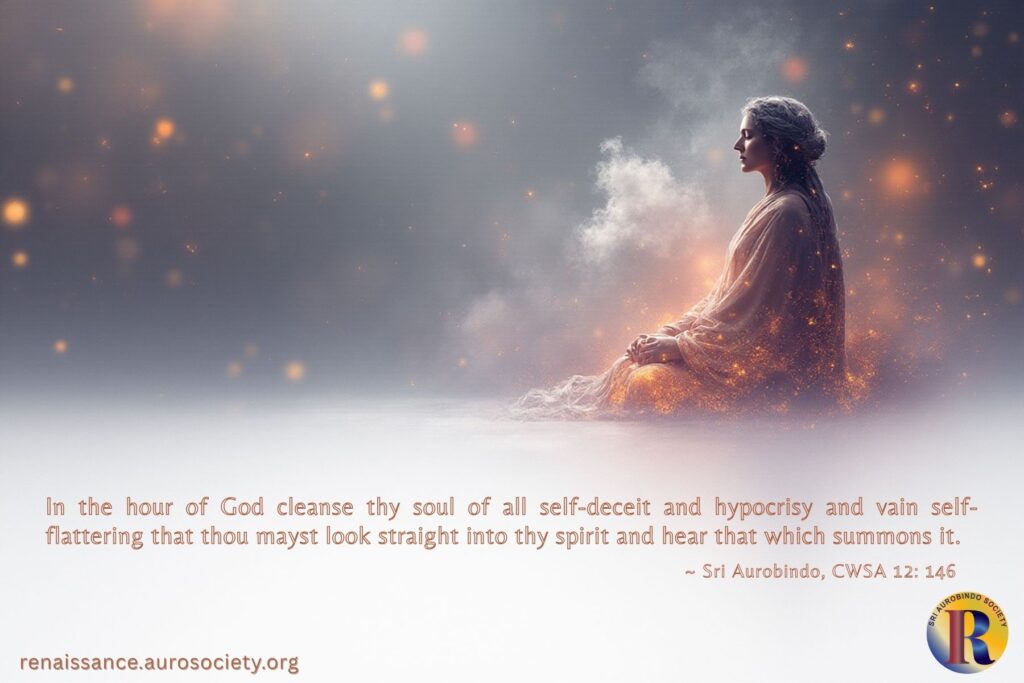Editor’s note: The author, Vijay Poddar, known to everyone in the Sri Aurobindonian family simply as Vijay bhai, had written this article during his college days. This was his second quarterly test answer in the First Year of Higher Course at Sri Aurobindo International Center of Education (SAICE). It was published in a special issue of the Ashram journal, Mother India, dated 15 August 1962 (Vol. XIV, No. 7).
Renaissance editors have made a few formatting revisions for the purpose of this digital presentation.

At the end of the 19th century the state of things that India faced was that of abject decline or decadence.
It was a grave question whether India would regain her freedom and be the spiritual leader of humanity or whether it would stumble on in the wake of European thought and forget herself in its materialism. All over the country there prevailed an attitude of serfdom.
The British had taken in hand the education of the people. And their universities were turning out anglicised youths blinded by the brilliant ideas of the West, youths that had forgotten their glorious past and mussed India’s guiding motive force, her very basis and foundation-spirituality.
It was then that Sri Aurobindo appeared on the political scene. He grasped Indian politics with a giant’s hands and shook the country to its very foundation so that a new birth might take place and a new India arise, infused with a spiritual fervour of patriotism.
The active political period of Sn Aurobindo was very short. It lasted from 1906, when he became the Principal of Bengal National College, to 1910 when he withdrew to Pondicherry. And if from it we leave out the one year he passed in Jail we are left with only three years. Yet these three years were the most momentous and creative in the history of Indian Nationalism. They symbolised the first national upsurge, and the change of an era.
In three years Indian politics transformed itself completely, left behind the age of timidity, prayer, protest and petition, and entered a new age of self-respect, self-confidence, and consciousness of India’s greatness and her nationhood. The fires of patriotism were lit. The cry of “Bandemataram” rang on all sides, and men felt inspired to die smiling for their country. Sri Aurobindo changed in three years the complete outlook of Indian politics.
Yet Sri Aurobindo was not new to the political field. For these years of action he had studied and prepared himself for many years in Baroda.

When he came to Baroda in 1893 he found the Indian National Congress made up of arm-chair politicians, with all talk and no action, men with no ideal in front of them, who prayed and protested and followed a path of “glorified mendicancy”.
Sri Aurobindo’s first work was to make Indians conscious of the Congress’ shortcomings, to remould this fumbling, moribund, aimless leadership into something clear-eyed, purposeful, dynamic and vigorous. He wrote articles in the Indu Prakash under the heading “New Lamps for Old.” These articles were filled with fiery yet deep criticisms which stunned the leaders of the Congress. They were soon stopped by the frightened Editor, but the voice had been heard.
These were the first steps, the first stones that were laid in the formation of the national edifice. They “formed the first ripple on the placid waters of Indian nationalism, the ripple that was later to become a mighty tidal wave” and carry everything before it.
After the articles were stopped, Sri Aurobindo worked in Baroda for seven to eight years, preparing the nation secretly and waiting for the moment of action. He toured Bengal once or twice to see the condition of the country. Sri Aurobindo sent Jatin Banerjee and his own brother Barin to join hands and prepare small groups for an armed revolt. He also contacted the secret nationalist parties of the West, formed his plans, and waited.
The ripe moment was not long in coming. It came with the partition of Bengal. The whole country rose as one against the move, angry, indignant. Sri Aurobindo found that the time had come to kindle the flames of patriotism. He plunged himself into the whirlpool of politics.
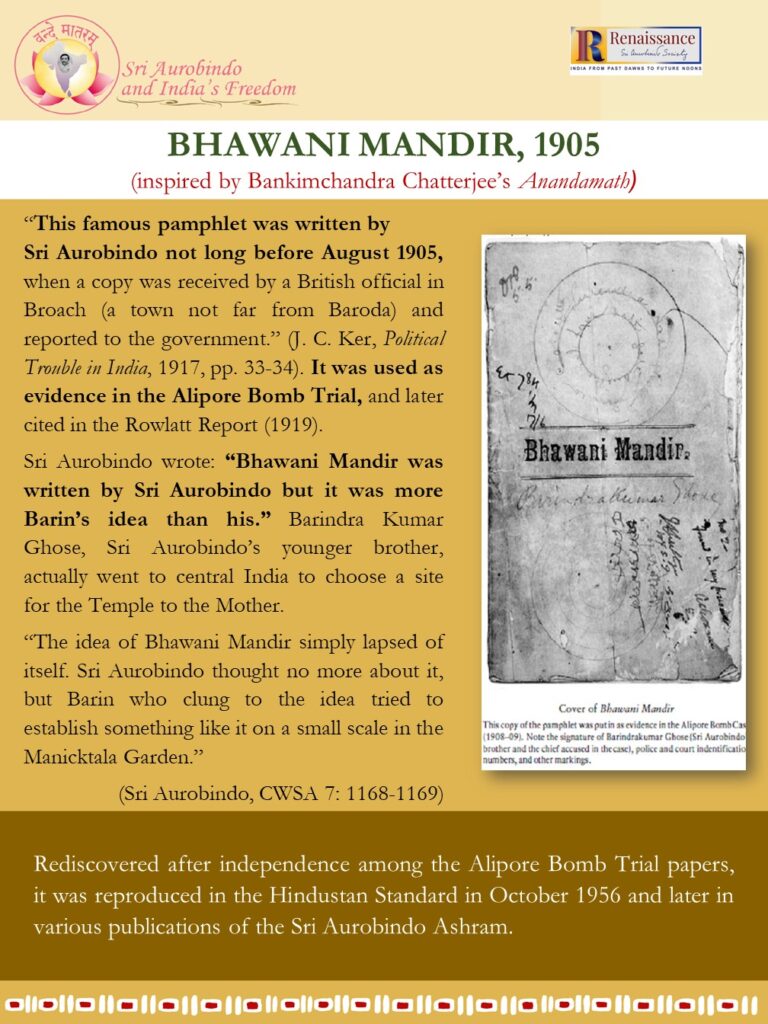
In 1905, he wrote a tiny book called Bhawani Mandir and in a trice placed the whole of the national political movement on a religious foundation.
He said that India was not merely a land of rivers and lakes and mountains. She was the Mother, living in the hearts of men and it was out of these hearts that she had to be resurrected.
Sri Aurobindo charged patriotism with a spiritual fervour and fused into one the love for the country and the love for God. He reminded that all awakenings of India in the past had had as their fountainhead the force of spirituality. And now was the need for Brahmacharins and Sannyasins to come forward and sacrifice themselves for their country and God. He made politics spiritual, and filled the youth with a new courage, fire and hope.
In 1906 Sri Aurobindo took up the editorship of the Bandemataram. This proved to be for India a heaven-sent boon. There for the first time he declared that Independence, unqualified unconditional Swaraj, was the one and only aim of India. Without it all reforms were useless. He even said in veiled hints that for a subject nation all means, even revolt, were justified if it was seeking its independence.
The days of Bandemataram were new inspiring days, when men lived and died with that phrase on their lips. And freedom, complete freedom, was the watchword.
Through the Bandemataram Sri Aurobindo created in the minds of the people the will to be free, and made them realise the necessity for sacrifice in achieving this end. He created the ideal of nationhood and kindled the sparks that roused the whole country to a fire of patriotism and a consuming thirst for Swaraj.
Together with this ideal he gave a plan of action which consisted of non-cooperation, boycott, Swadeshi, passive resistance, national education and national courts. He conceived the idea of a State within the State, which would control the lives of the people and finally bring the British government climbing down.
Sri Aurobindo prepared and sent small groups for propaganda work, men who would organise the people for a complete non-cooperation movement and passive resistance. But his passive resistance was not idle or weak. It included the breaking of oppressive and wrong laws. And it encouraged the people to start their own schools and industries, and to oppose undesirable British laws and British trade in each and every manner. He gave a mode of action to the people.
But, on the other hand, he secretly continued giving some form to his plan of direct insurrection, and encouraged people to take up physical activities and be ready for an armed revolt. He even encouraged the making of bombs and the distribution of rifles.
Thus we see that these were the four main lines of his action. He created the desire and will for independence in the minds of the people, revealed to them the country as the Mother, organised the masses for passive resistance, and small groups for an armed fight.
But always he worked in the background, pushing and guiding people from behind.
However, the Bandemataram case, the Surat Congress and Its capture by the Nationalists and finally the Manicktalla bomb case brought Sri Aurobindo into the limelight. He stood revealed to the masses as the symbol and leader of Indian Nationalism. Millions flocked to see him and hear him. The fight for Independence was in full swing and finally the will to freedom got ingrained in the people.
The Bande Mataram, whose policy from the beginning of 1907 till its abrupt winding up in 1908 when Aurobindo was in prison was wholly directed by him, circulated almost immediately all over India. During its brief but momentous existence it changed the political thought of India which has ever since preserved fundamentally, even amidst its later developments, the stamp then imparted to it. But the struggle initiated on these lines, though vehement and eventful and full of importance for the future, did not last long at the time; for the country was still unripe for so bold a programme.
~ Sri Aurobindo, CWSA, Vol. 36, p. 7
Then Sri Aurobindo was imprisoned for a year. During that time he developed his yoga. He already had at Baroda the experience of Nirvana. Now he saw Vasudeva or Narayana in all. He had chosen his path. Henceforth he was guided only by the Divine Voice.
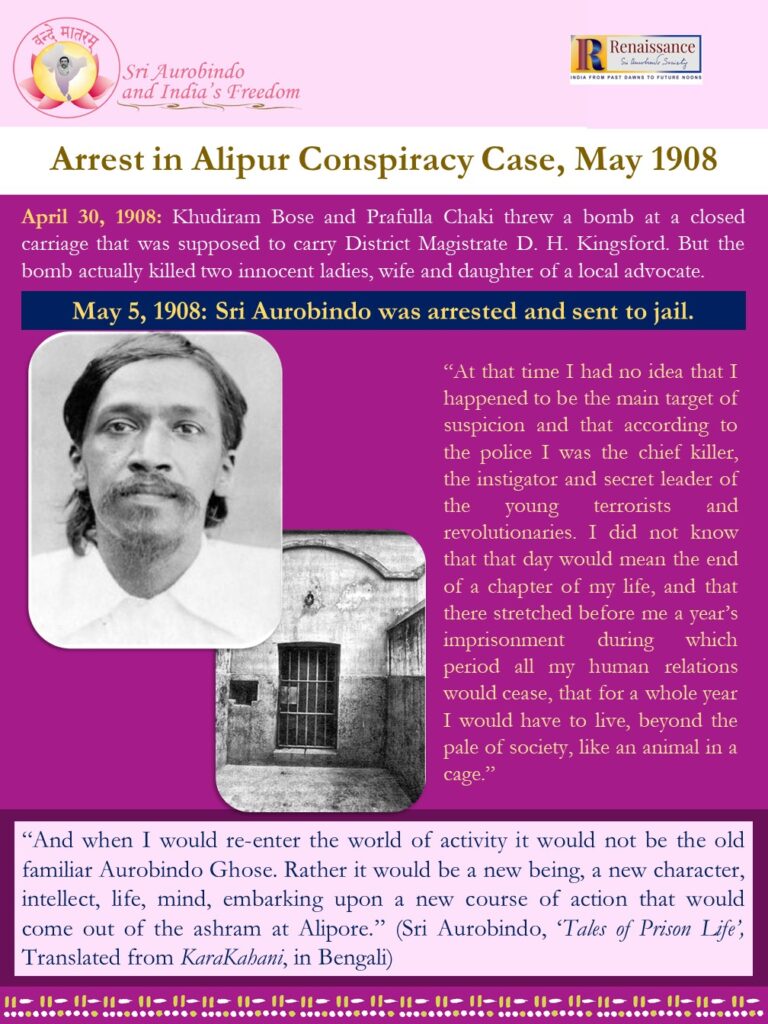
And when he came out of the prison he found Indian politics dead, defeated, full of despair. Lost were the enthusiasm and the religious fervour of sacrifice. Sri Aurobindo again organised meetings and laid down for the country and the Congress a definite plan of action through the Karmayogin. Then when the British were contemplating to arrest him he got a clear Adesh (command) from above and went to Chandernagore and subsequently came to Pondicherry.
Thus ended the political life of Sri Aurobindo, but his work continued.
The movements he had started gained momentum and finally conquered. India regained her political freedom on 15th August 1947. Even from Pondicherry Sri Aurobindo continued to guide spiritually the destiny of India. Well may we say that he was the founder, the creator and the leader of India’s independence as the first step towards her ultimate spiritual leadership in a new world of Freedom, Peace and Unity that are for ever.
Also see:
Sri Aurobindo and India’s Freedom
~ Design: Beloo Mehra

